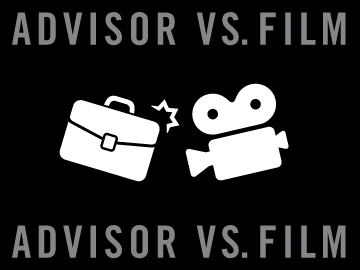
Advisor versus Film: Wall Street
Film: Wall Street (1987)
Expert: Kathleen Peace, wealth manager at Bennett March and former fixed-income financial consultant at Solomon Smith Barney.
Accuracy Rating: 6/10
Released in 1987, Wall Street was one of the first films to offer an inside look into growing immorality at trading firms during the late ’80s.
Charlie Sheen plays Bud Fox, a young stockbroker at fictional firm Jackson Steinem and Co. He works diligently to land enigmatic corporate raider Gordon Gekko (Michael Douglas) as a client, and uses insider trading to maintain their relationship.
Director Oliver Stone has said Gekko is the embodiment of all that’s wrong with American capitalism. The film’s writer, Stanley Weiser, spent three weeks in brokerage firms in New York before writing the script. In 2008, he wrote in the Los Angeles Times that he based Gekko on real-life investors Carl Ichan, Ivan Boesky and Michael Ovitz.
“After the film came out, many people who worked in the financial world felt that they knew someone like this character,” Weiser says. “Others claimed [Gekko] was unrealistic and gave Wall Street a bad name.”
While some aspects of the film are accurate, others are exaggerated and such events would be nearly impossible today, says advisor Kathleen Peace. She worked at Solomon Smith Barney on Wall Street from 1997 to 2002; first as a financial consultant selling fixed income to retail salespeople, then as an emerging market debt researcher.
Firm environment
Through the movie, we see Fox and his stockbroker colleagues constantly fielding calls and yelling into headsets. It appears as though they sleep, eat and breathe their work — but is this realistic?
Peace says yes. When she was at Solomon Smith Barney, she would work for almost 11 hours without stopping.
“Everyone had headsets because you’re on the phone all day. You’re in by 7, you put your head down and you didn’t really look up until 5 at least. There’s no lunch break; the whole desk would either order in food or you’d have brought something to eat.” Much like Gekko’s comment, “Lunch is for wimps.”
The fictional Jackson Steinem and Co. is a loud place to work. Peace says the film was exaggerating. “Sometimes we were yelling at each other and sometimes [it was quieter],” says Peace. “It depended on what was going on in the market.”
Insider trading tactics
Fox first gets Gekko’s attention by offering him inside information about Bluestar Airlines, where Fox’s father (played by his real-life father, Martin Sheen) works as a maintenance foreman and union representative. Once Gekko hires Fox as a trader, Fox is often in dubious information-gathering circumstances.
At one point, Fox follows Gekko’s rival through New York to discover his next investment. He also dresses as a cleaner to infiltrate law firms and businesses to view important documents.
Peace thinks it would be impossible to go undercover at any firm nowadays, because of heightened security following the September 11, 2001 terrorist attacks.
“A random person could not have become a janitor and started poking around. After 9/11, the security got so tight in our buildings that we all had magnetized picture ID and were scanning our bags through; it was like going to the airport every time we went into our buildings,” she says.
By suggesting Gekko buy Bluestar Airlines, Fox unknowingly condemns the company to dissolution. Fox thought Gekko would just cut salaries, but learns Gekko wants to liquidate the company. After realizing he sold out his father, Fox comes up with a scheme involving stock manipulation and deceit to thwart Gekko’s plot.
Stock manipulation and securities fraud
One of Gekko’s many criminal acts is leaking news of a company takeover to the press to raise its share price and hinder rivals from purchasing controlling shares. Fox later uses the same tactic to prevent Gekko from controlling Bluestar Airlines.
Fox alerts the press to the Bluestar takeover, and has his colleagues invest their clients’ money in the airline to pump up the stock. Then, once Gekko is fully invested, Fox tells his colleagues to sell. The stock plummets, and on Fox’s advice Gekko sells his shares and loses millions.
Would that scheme be possible today? Peace says maybe, but not at the speed it occurs in the movie.
“[Rules] have been put in place by securities regulators and the markets in general now that may not allow that to happen so quickly. But I don’t see why it couldn’t happen.”
And she says while stock price manipulation could still occur, it would be harder to pull off today.
“It would be more difficult now based on [tightened regulation] since 2008 and the increased scrutiny of the market.”
Greed is good
Gekko utters the most famous line in the movie, “greed is good,” when he speaks at a conference about the ideology of corporate America. In three words he encompasses the film’s theme — the battle between greed and morality. While much has changed since 1987, Peace thinks the greed-is-good attitude is still prevalent on trading floors today.
“I don’t think that will ever change; I don’t know how it could. It’s clear that the guys at the top don’t care about clients,” she says. And, she says books such as Michael Lewis’s Flash Boys show that today on Wall Street, greed and money are more important than ethics.
Near the end of the film, Fox’s boss Lou Mannheim (Hal Holbrook) — who is the firm’s conscience through the movie and advocates following the rules — expresses the consequences of the greed-is-good mentality:
“The main thing about money, Bud; it makes you do things you don’t want to do.”
While some of the concepts are representative of life on Wall Street, much of the film is exaggerated; Peace gives the film an accuracy rating of 6/10.

